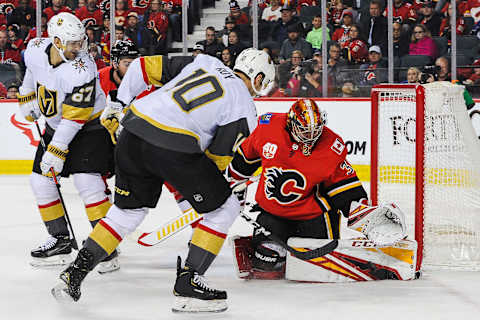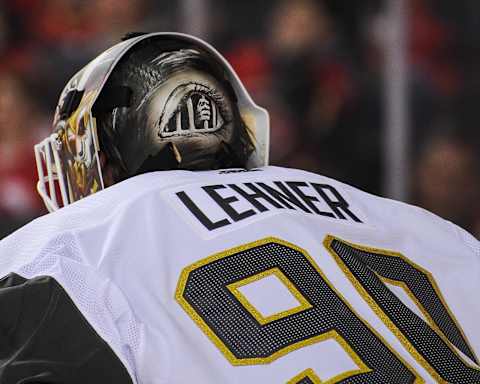Vegas Golden Knights: Breaking down the Salary Cap ramifications for 2020-21


Of all the question marks surrounding the Vegas Golden Knights in the wake of the coronavirus crisis, the Salary Cap situation for 2020-21 will be the most fascinating one to keep an eye on.
What a difference a few weeks can make. It wasn’t that long ago that reports suggested the salary cap for 2020-21 could rise to as much as $88 million, which would have been very good news for the Vegas Golden Knights.
In the worst-case scenario, the cap would have come in at around $84 million which still would have been a significant rise on the $81.5 million salary cap for the 2019-20 regular season.
However, the sporting landscape has changed and is still ever-changing in the wake of COVID-19, and it is now nearly impossible to imagine the cap rising for next year.
More from Vegas Hockey Knight
- The moment the Vegas Golden Knights have been waiting for
- 3 Golden Knights players deserving of the Conn Smythe Trophy
- If Golden Knights win Stanley Cup, who should Mark Stone pass it to first?
- Why are Vegas Golden Knights fans obsessed with flamingos?
- Just one more game for Golden Knight supremacy
I could be wrong of course but, given the financial hit the NHL will take the longer this current hiatus drags on for, the league’s bottom line will take a dramatic hit and everyone associated with the sport from owners to players will be impacted in some way shape or form.
Therefore, it is feasible to project that NHL Commissioner Gary Bettman will instead opt to freeze the salary cap and all 31 teams will have $81.5 million to play with for the second straight year.
Just how will a cap freeze impact the Vegas Golden Knights?
It is a good question and one we will attempt to answer after first mapping out how they managed the cap this year.
But, one thing is for sure and that’s the fact that the Golden Knights may have to alter their off-season plans in order to deal with the fact that the salary cap won’t rise as initially expected.
Let’s dive in…

The 2019-20 Roster
First and foremost, the Vegas Golden Knights have the core of their roster locked up for the foreseeable and all of their big hitters are signed to long contracts.
So, in that respect, the heart of their team won’t really be impacted from the salary cap remaining at where it is.
However, and as we saw this year, their ability to add depth to the roster will be somewhat hindered now.
After signing franchise center William Karlsson to an eight-year, $47,200,000 contract on June. 24, 2019, the Golden Knights had to clear some bodies off the roster in order to accommodate that deal.
Despite the fact that the deal was team-friendly, Vegas was still in danger of not being cap compliant which epitomizes their cap struggles this year.
As a result, key role players in the ilk of defenseman Colin Miller and forwards Nikita Gusev and Erika Haula were traded, while the likes of Pierre-Edouard Bellemare and Ryan Carpenter were allowed to walk in free agency.
Those moves ensured that the Golden Knights were cap compliant to begin the year, with rookies such as Cody Glass, Nicolas Roy and Nic Hague all on entry-level contracts while filling key holes in the lineup.
That lack of depth really hurt Vegas on occasion, however, especially when big stars went down with injury, while they employed the tactic of sending the likes of Roy and Glass down to the AHL on a consistent basis in order to accrue cap space prior to the Trade Deadline.

They acquired two players at the Deadline in goalie Robin Lehner and forward Nick Cousins, while they had traded for depth forward Chandler Stephenson from the Washington Capitals earlier in the year.
The Knights managed to get both the Chicago Blackhawks and the Toronto Maple Leafs to take on some of Lehner’s salary, meaning Vegas was only on the hook for $1,400,000 of the goalie’s sizeable $5 million cap hit.
Plus, by trading Cody Eakin and his $3,850,000 cap hit to the Winnipeg Jets prior to the Trade Deadline, the Golden Knights remained cap compliant even after adding some depth to the lineup while keeping flexibility for when Alex Tuch and his $4,750,000 cap hit came off the LTIR.
Overall, it was a year of really crunching the numbers for the Vegas Golden Knights who had to walk the salary cap tightrope more than most teams.
They had hoped it would be different in 2020-21 but, due to the coronavirus crisis, it promises to be more of the same…

The 2020-21 Roster
This is where it gets interesting.
Assuming that the salary cap for the 2020-21 NHL season remains at $81.5 million, and that seems the most feasible outcome right now, the Golden Knights will have little wriggle room to play with yet again.
As it stands, they will be spending $72,625,000 on 14 players on the roster next year, including $40,300,000 on seven forwards, with around $11,375,000 in cap space to play with.
That all sounds nice but, keep in mind, the Golden Knights do have a grand total of eight pending free agents to deal with.
We’ve mapped them out below with their current salaries:
UFA’s:
- Ryan Reaves, F, $2,775,000 Cap Hit
- Tomas Nosek, F, $1,000,000 Cap Hit
- Jon Merrill, D, $1,375,000 Cap Hit
- Deryk Engelland, D, $700,000 Cap Hit
- Robin Lehner, G, $5,000,000 Cap Hit
RFA’s:
- Nicolas Roy, F, $720,000 Cap Hit
- Nick Cousins, F, $1,000,000 Cap Hit
- Chandler Stephenson, F, $1,050,000 Cap Hit
Now, we will be taking a deeper dive into what free agents could go and who could stay later in the week but, for now, four or five of the eight players set to hit free agency in the off-season will remain.
I can see either Ryan Reaves or Tomas Nosek staying, while it is likely that Deryk Engelland could retire and I can’t see Jon Merrill being retained either.
That leaves the biggest question mark on UFA Robin Lehner, who will likely want a significant increase on his current average annual value of $5 million.
Should that be the case, I can’t see the Golden Knights wanting to swim in those waters given that they are already committed to paying starting goalie Marc-Andre Fleury $7,000,000 per year through 2021-22.
Over $12 million on two goalies? That just isn’t a blueprint for success in a hard cap sport.
Then that brings us on to the Golden Knights’ three pending Restricted Free Agents.
Given that rookie Nicolas Roy hasn’t amassed enough service time yet, Vegas will be able to give the depth forward whatever contract they so wish pretty much, so his cap hit won’t rise too much above $720,000 for 2020-21.
As for Stephenson and Cousins, both players are arbitration-eligible and, as such, could also be offer-sheeted which would drive their value up.
Although, it is worth noting that any RFA can get offer-sheeted, not just arbitration-eligible RFA’s.
However, given that both are role players, it is likely that the Golden Knights will be able to thrash out new deals with both Stephenson and Cousins without too many complications and without having to overpay either player.

All of the above in consideration, then, and it is fair to assume that Vegas will spend a large chunk of the $11,375,000 cap space they have available on their group of free agents.
For example, say they spend a combined $8 million to keep Ryan Reaves, Nicolas Roy, Chandler Stephenson and Nick Cousins, that would leave the Golden Knights with just over $3 million to spend.
Part of that would need to go on a backup goalie if Lehner doesn’t return, while keeping four of their eight free agents would give them 19 players on the roster.
As a result, they would still need to fill out the remainder of the roster and that could be done by calling up forward Cody Glass and defenseman Nic Hague, who are both on their entry-level deals and carry cap hits less than $1 million.
Peyton Krebs, the 17th overall pick in the 2019 NHL Entry Draft by the Golden Knights, could be a dark horse to make the NHL roster out of training camp and battle for a role on the lineup.
So, before we move on, let’s take a look at what the roster could look like next year keeping in mind everything we have covered above.
Offense
Line 1: Pacioretty-Karlsson-Stone
Line 2: Marchessault-Stastny-Smith
Line 3: Cousins-Glass-Tuch
Line 4: Carrier-Stephenson-Reaves
Scratches: Nicolas Roy, Peyton Krebs
Defense
Pairing 1: McNabb-Schmidt
Pairing 2: Martinez-Theodore
Pairing 3: Holden-Whitecloud
Scratches: Nic Hague, Dylan Coghlan
Goalies
Starter: Marc-Andre Fleury
Backup: TBD
As you can see, the roster will largely remain intact from this year with the Golden Knights relying on Cody Glass to stay healthy and make progress in his second year in the NHL, while they would also need Alex Tuch to remain on the ice too.
Peyton Krebs could be on the outside looking in should he enjoy a strong Training Camp, and the same could be said for prospect forward Jack Dugan once he signs his entry-level contract.
Plus, if they bring back all three of Nicolas Roy, Chandler Stephenson and Nick Cousins, then that does give them some depth in the bottom-six of the lineup.
The defense would remain the same with the likes of Nic Hague and Dylan Coghlan battling it out for the seventh D role, while Vegas would need to bring in a backup goalie should Robin Lehner prove too expensive to keep as I predict right now.
Whatever way you paint it, though, the Golden Knights look set to be right up against the cap yet again in 2020-21, and that will have some big implications…

What else the Knights need in 2020-21
It is no secret that the Golden Knights crave a puck-moving defenseman and an absolute horse on the blueline.
The perfect candidate to tick both those boxes could be on the open market this off-season in St. Louis Blues Captain Alex Pietrangelo, who is a pending UFA.
Pietrangelo would tick all the boxes for Vegas, as we outlined here, but he will attract a whole army of potential suitors and will likely command anywhere between $8-$11 million on the open market.
That would blow the Golden Knights out of the race given their cap situation next year, although it could have been so different had the salary cap risen as expected only a few weeks ago.
Of course, the Golden Knights could opt to try and trade one of their big hitters from the top-six, with either Paul Stastny or Reilly Smith seeming the most expendable options, in order to make room for a big-ticket defenseman.
That would just be speculation on our part at this moment, however, and we have tried to base this on fact.
Overall, should the salary cap remain at $81.5 million for the 2020-21 NHL season, then the Vegas Golden Knights will once again be pressed right up against the cap given the amount of free agents they have to try and re-sign.
They can play hardball with their restricted free agents in Nicolas Roy, Chandler Stephenson and Nick Cousins, but even getting that trio signed to new deals all at a bargain rate won’t give them too much relief.
Hiatus shouldn't be a stain on Pacioretty's year. dark. Next
So, while they will still boast a Stanley Cup contending roster, the Vegas Golden Knights for the second year running won’t have the scope to fill too many roster holes or go out and attract a big-name free agent defenseman to truly push them over the top.
That is the harsh realities of the post-coronavirus world we now live in.
All salary cap date courtesy of capfriendly.com